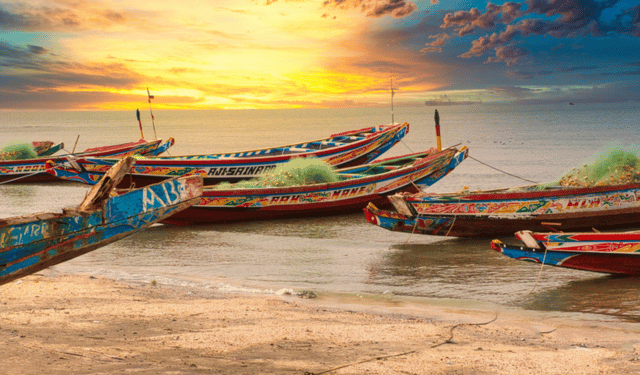Artisanal fishing in Senegal. Tradition in danger of disappearing – Artisanal fishing along the West African coast is one of the oldest and most vital economic activities for coastal communities on the Dark Continent, particularly along the Atlantic coast of Senegal.
Here, tradition and survival are intertwined, with local fishermen using colourful pirogues, simple tools and knowledge passed down through generations to ensure the livelihood of their families and feed local economies.
One of the most emblematic places in the history of artisanal fishing in Senegal is a small town, little more than a village, post south of Dakar and answering to the name of M’bour. Hundreds if not thousands of pirogues every day, and so even before European colonisation, land freshly caught fish, less and less sufficient to feed families and feed the local market.
Today, artisanal fishing in Africa faces many challenges, including the sustainability of marine resources, pollution and above all competition from industrial fishing.
The latter especially in the last decade has seen an intensification in the number of ocean fishing boats, most of them belonging to European companies that through the fraudulent use of African flags pose a serious threat to the sustainability of the oceans and the food security of African coastal communities.
This fraud involves complex regulatory avoidance mechanisms, making monitoring and regulation difficult, but its impacts are profound.
European ship owners, often from countries with a strong fishing industry, purchase or charter vessels that they then register under the flag of African countries. This practice, known as flagging out, allows vessels to operate under the looser rules of flag countries, many of which do not have adequate resources to monitor fishing activities. In addition, some local fisheries management officials deliberately turn a blind eye, or even both, by accepting bribes in exchange for ignoring violations.
These vessels do not respect the boundaries of the exclusive economic zones (EEZs) of coastal countries and also fish illegally in protected or artisanal fishing areas. The illegally caught fish is transhipped at sea, a practice known as transhipment, to authorised vessels and that’s it.
To ensure a sustainable future, the challenges of managing marine resources, protecting fishermen’s rights, but also paying more attention to the practice of illegal, unreported, and unregulated fishing by severely punishing those who engage in it, must be addressed.
The artisanal fishermen of M’bour have no voice and those who do, such as the EU, suffer from chronic hoarseness.
Artisanal fishing in Senegal. A tradition in danger of disappearing







